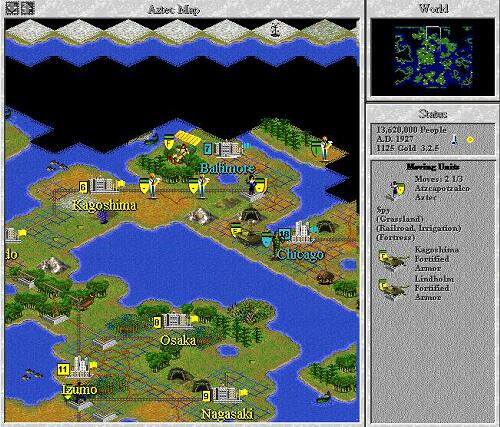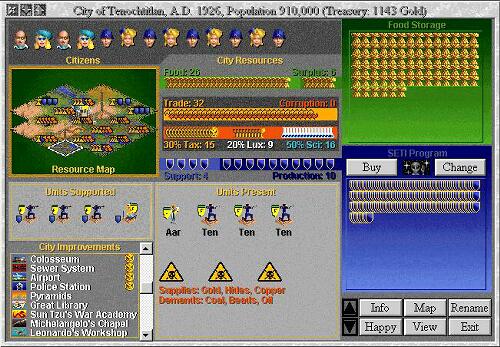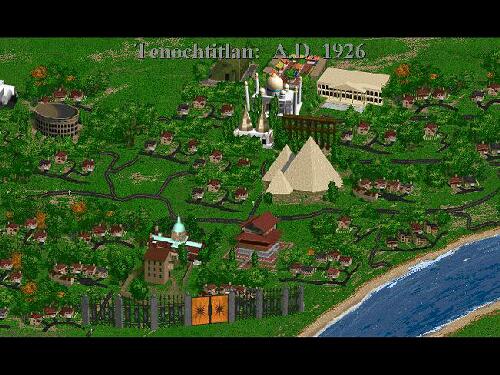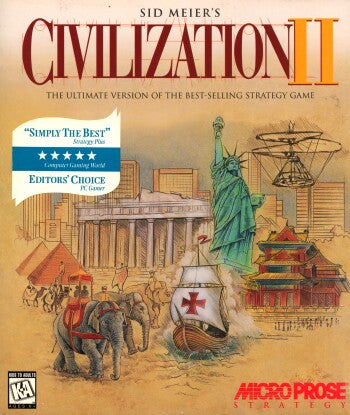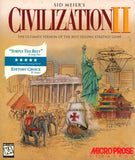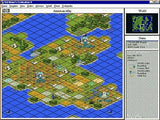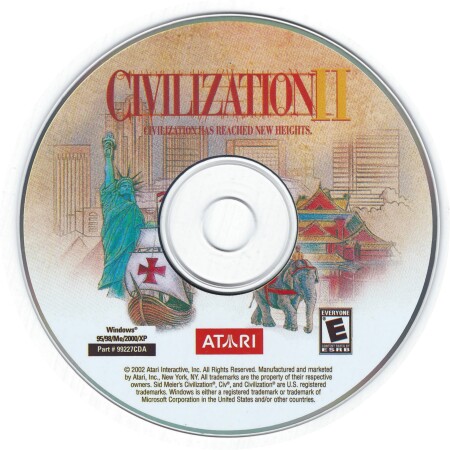
Actual Game
Civilization II
MY PROMISE WHAT IS INCLUDED I will also provide a compatibility CD that will allow the game to run under ALL VERSIONS of Windows 11, 10, 8, 7, Vista and XP, both 32 and 64 bit. INSTALLATION Want to play? Click the icon. Want the game off your computer? Click Uninstall. Zero hassle. TECH SUPPORT In the extremely rare event I cannot get this title to work on your system I will take it back for a full refund. All I ask is minimal assistance from you during the troubleshooting process. |
The Game
There are very few games which are truly magnificent. When the original Civilization was released in 1993 it was something special: A unique and original strategy game which had incredibly compelling gameplay. That original is one of the few PC games I have ever played for more than 18 hours straight.
Civilization 2 also made it to that list. The spirit of the original has been kept, yet the designers have done more than just the first-glance cosmetic surgery. Under the surface lies a rebuilt game -- and it is even better than the original.
Civ2 is about building an empire. You start with one tribe in the year 4000 BC and your aim is to steer your fledgling nation to world supremacy, either by conquering the whole world or by being the first nation to land colonists on a distant star system. Along the way you have to deal with exploration, building new cities, researching new technology, maintaining an army, keeping your people happy and generally helping your people to prosper. This balance of goals is far from trivial to achieve, and therein lies the beauty of the game; relatively simple to play, yet difficult to master.
Cities are the engine rooms of your nation. A city once built can use its population to harvest resources in squares within its city radius; these can produce food (bushel icons), production (shields) or trade (fur skins). A food surplus is needed to let the city grow, shields allow you to build city improvements or new (military) units, and trade can be divided up into tax (income for your nation), luxuries (which make people happy) and science (which goes towards new tech).
The Civ2 juggling act involves defending and developing your existing cities while striving to expand to build new cities. At the same time you need to keep up in the tech race, and usually to keep good relations with other nations in the game (up to 7). You need to run the right sort of government when it becomes available; early on you'll be despotic or a monarchy, later on you can be fundamentalist or a democracy; there's also communism and the republic to dabble with. Each has its pros and cons (eg. democracy has a big production boost but also causes citizen unrest when military units are out on conquests).
Keeping up in the tech race is vital to success. Each tech depends on previous techs having been researched, so there's a tech tree to climb to get to the very top where you find stealth bombers, paratroopers, tanks and cruise missiles. At the outset it's spears and arrows. The online info can tell you what you need to research to head towards a certain goal. Tech advances let you build certain city improvements like factories or SAM missile sites, as well as things like solar plants to reduce global warming from pollutants (yes, Civ2 is environmentally friendly!).
Wonders of the World
In addition to building regular city improvements, you can also build one of the 27 Wonders. Each has a special power, but may eventually expire. Building Wonders improves your Civ score and can give your nation a big advantage, but they take a lot of production shields which could be spent elsewhere. Of course, if another nation builds a Wonder you can always try to capture the city it's built in, then you get the benefits of the Wonder. Building Wonders is a major effort, but you can use caravans to boost their production. Caravans are also used to establish trade routes, which can be very profitable if the right goods are taken to the right cities (but luckily this new trade system is only something of a voluntary aside from the main thrust of the game).
Diplomacy
It doesn't always pay to kill everyone who moves. If you're in a sandwich between 3 or 4 nations you might want to keep peace where you can and concentrate on one opponent at a time. Forging alliances can be good if you have a common strong enemy. Exchanging tech is a cheap way to advance your research.
But just as diplomacy can work for you, it can work against you. Attacking one country might harm your international status and reputation, or worse might bring your opponent's allies into a war against you. If you're doing well other nations will get jealous and team up against you. It can pay to not be the strongest country, as they're usually hated the most. However, you can offer cash, tech or military units to countries to placate them, or other countries might offer you gold to help them out. Overall the new diplomacy is good. There are many levels of treaties, including temporary cease fires (which are often imposed on you if your own government is a republic or democracy).
Combat
In Civ1 the combat was very simple. The attacker and defender strengths gave combat odds, and one unit won and the other was destroyed. In Civ2, combat is much expanded and improved. Each unit now has an attack and defence factor, plus a firepower and hit point rating. More modern units have higher firepower and hit point figures.
When one unit attacks another, the attack and defence factors are modified by terrain and experience factors. This gives the odds of each unit winning a round of combat. Combat continues until one unit is destroyed. This system makes it much much harder for a phalanx to destroy a tank, but you can still just sometimes have a shock result, which is good. Wounded units heal if rested, or heal completely if in a city with barracks. A city with city walls (3x defence to most units) and a barracks can be very hard to overcome early in the game. Some people may have prefered Civ2 to have a Master of Magic style tactical combat system, but I think keeping combat more abstract adds to the overall strategy.
The AI
A lot of time seems to have been spent by the developers in making the AI a lot tougher than in Civ1. The opposing nations now make much better use of terrain improvements, use more coordinated attacks, and are generally very sneaky. The AI will use first strike nukes, and follow them up. It will gang up on poorly defended units. Overall, the game is a challenge, and you have to have all aspects of your game at their best to do well at the hardest levels. The AI cheats appear to have been removed; the computer now seems to build wonders fairly, and it follows the same rules you have to. While there still may be cheats, I haven't noticed any obvious biggies as of yet. There are "holes" you can exploit (the cruise missile seems a little too powerful against city armies) but victory is much harder to earn than it was in Civ1. The game is geared to run the distance, rather than be over too quickly. Note that if you want to cheat, there's a very accessible cheat menu you can turn on (though doing so marks your high score entry accordingly).
The Map Editor
Civ2 has a companion map editor; you can use this to let your artistic ability run wild. As an example I made a map of the United States and saved it as a map file. In the main game you can then load a map file, toggle the cheat mode on, and play around with all manner of settings before saving the finalized map as a full-blown scenario. The game has many presupplied maps you can work with, and there are two large sample scenarios which you can tinker with -- Ancient Greece and World War II.
